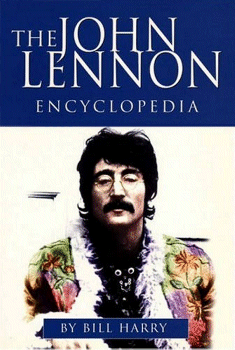Sixties
City presents
a wide-ranging series of
articles on all aspects of the Sixties, penned by the creator of the iconic
60s music paper Mersey
Beat
|
Sixties
City presents
a wide-ranging series of
articles on all aspects of the Sixties, penned by the creator of the iconic
60s music paper Mersey
Beat
|
|||||
|
 |
My
book, which was first published in 2000, and at more than 1000 pages with
no photos, had the largest amount of text on John of a book up to that time.
It is currently out-of-print, although I will seek a publisher and update
it. It was so large that the publishers decided to cut out 40,000 words
or the book would have been too large in size to print a paperback edition.
If I ever did try to re-write it, it would have to be a two-volume work.
In the introduction I wrote: As with this book’s sister volume, ‘The Beatles
Encyclopaedia’, I have used a huge variety of sources in my research. Naturally,
these include my own memories of art school days with John, which led on
to the Mersey Beat newspaper and scene, and our friendship which lasted
until John left to make his home in New York. In London, I regularly met
John in clubs such as the Scotch of St. James and Bag O’ Nails. I was also a regular visitor to Apple, and it was at an Apple Christmas party that John first introduced me to Yoko. Several times, whilst at the Speakeasy Club, he would offer my wife Virginia and me a lift in his car as he and Yoko travelled to the Bag O’ Nails. Obviously, the hundreds of interviews I have conducted over the past 40 years have been utilised – and they have included every member of The Beatles, Brian Epstein, Neil Aspinall, and a wide range of characters from John’s life. More recent interviewees have included Stan Parkes, Rod Davies, Charlie Lennon, Len Garry and Nigel Walley. I also appreciate the help of numerous Beatles enthusiasts such as Bill Logan, and the wealth of information in publications such as Beatlefan, Beatles Now, Beatles Unlimited and Good Day Sunshine. I have long been a hoarder of clippings relating to John and The Beatles, in addition to collecting magazines, fanzines, newspapers and books, all of which have proved valuable research tools – as has the world of the web! Personally, I look at John’s life as B.Y. and A.Y. – before Yoko and after Yoko. From a personal perspective, I experienced much of the B.Y. period and little of the A.Y. one. We can only speculate what John might have created had he not met Yoko. We would have had solely the genius of John Lennon, rather than the splitting of his abilities to merge with – and perhaps be submerged by – the avant garde theories of Yoko. Did John merely become a funnel through which Yoko could channel her own creative ideas? The A.Y. period is well documented – indeed, exhaustively chronicled – because John and Yoko made so many films, recordings and documentaries of their love affair. So, was it the romance of the century, or was it merely an obsessive love? Since John’s death, most of what we see about John on film and TV is of the A.Y. period because Yoko, as executrix of his estate, has complete control and the 28 years before he met Yoko are clearly of less interest to her. Certainly, though, the ideas and desires of Yoko seemed to predominate the famous relationship. Her own recordings were used on John’s releases (some fans regarded ‘Double Fantasy’ as merely a John Lennon EP), the couple settled in New York, which was basically Yoko’s home, and John became a house-husband – allegedly a prior condition insisted on by Yoko before she agreed to have Sean. Camille Paglia on ‘The South Bank Show’ described John as “An innocent in Yoko’s clutches” and added that Yoko “crushed John’s originality with the moralism and political correctness that she imposed on him.” She concluded that in his time with Yoko, Lennon may have been a happier person, but he was a lesser artist. On the other hand, it is unfair that Yoko has been the subject of as much hate as love from Lennon fans. The problem has been that much of John’s personal quotes about the relationship are disingenuous. John had the tendency to rewrite elements of the relationship and create an often-inaccurate picture of certain events. His own depictions of his love were not reliable. Witnesses to certain events contradict many of the things John said. This is a controversy that will run and run. John Lennon left a unique legacy in music and popular culture, and Yoko is a vital and essential figure in that legacy. Other books by Bill Harry |
|
Article
Text
UK
web hosting by
|